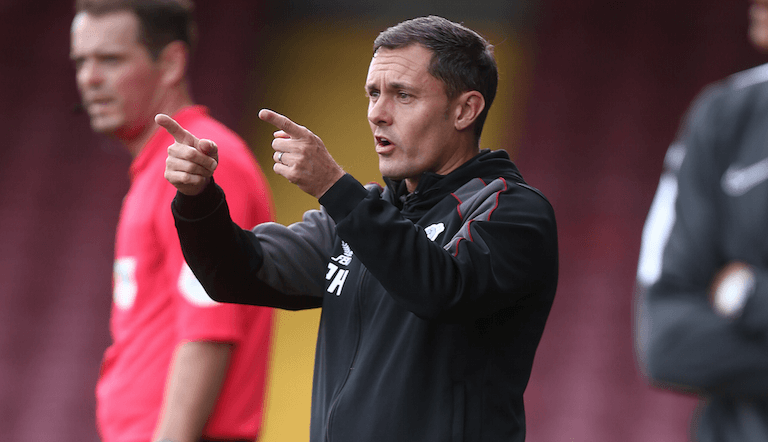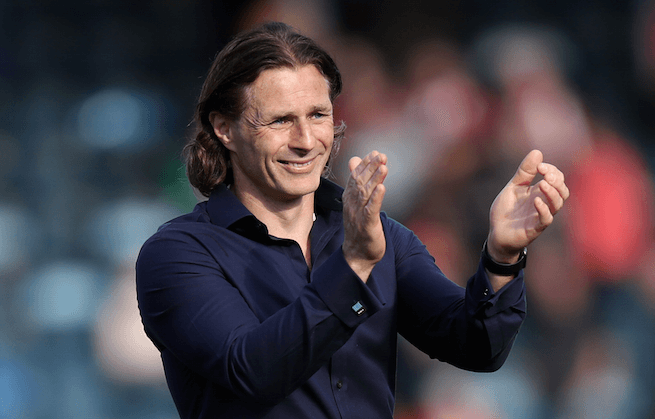Next Rotherham Manager Odds: Would Mark Bonner be the perfect fit?

Rotherham United legend Paul Warne has left the club for Derby County, ending - for now - an association that dates to 1999.
It’s a time of upheaval for the Millers, who have also lost assistant manager Richie Barker, coach Matt Hamshaw and goalkeeping coach Andy Warrington to the Rams.
The good news is that Warne has upgraded the recruitment process at the New York Stadium, transformed the culture and left the club its best squad in recent history.
While Rotherham were relegated from the Championship in three previous attempts, they have started this campaign with just one defeat in their first nine league games.
The Millers have only managed that form at this level once (technically twice) previously, and 2018-19’s integrated runs of one defeat in 10 included 10 draws within a 13-game sequence.
From that perspective, Warne’s work means this job holds far more appeal than the gig he himself took on back in November 2016, after Kenny Jackett bolted five games in following Alan Stubbs’ ill-fated reign.
Who is the right man to take on Warne’s work, though?
Mark Bonner looks an excellent candidate. Here’s why...
Man management
One of the biggest things Warne did in charge was run a fine tooth comb over the characters brought into the South Yorkshire club.
He spoke to potential recruits for an hour or two, looked for clues as to their personalities, and only brought in the ones who he felt could shape what had been a broken dressing room.
The Rotherham side that bounced back in 2017-18 was far from the most enterprising footballing side, but they battled for everything and for a lot of fans, there was a sense of having their club back – in many respects, it’s been that way ever since.
The Millers have a group in which everyone cares for one another and while the next manager doesn’t have to be quite as open, or at times emotionally vulnerable as Warne can be, it’s so important that they keep that culture firmly in situ.
Mark Bonner is a very personable figure within the game, more so than a lot of managers, with a fantastic understanding of the modern player.
While Bonner will command respect and set boundaries, he has a human side as well which is essential for this role.
Attention to structure
Rotherham do not currently have a Sporting Director or equivalent, which is something they will have to recruit for, if Tony Stewart is not at a stage of life at which he wants to have a hands-on role.
Bonner has benefited significantly from working under one at Cambridge in Ben Strang, who has done a fantastic job with the operational aspects.
At the same time, Bonner is somebody who has an interest in areas of the football club outside 90 minutes on Saturday, having worked at the Abbey in a multitude of roles over the previous 13 years.
While he would not want too many administrative issues in his inbox, Rotherham may be at a stage where they will have to feel their way into a new structure, without Warne.
The job may encompass too much for a coach who might be a fantastic tactician or training ground operator who has come from Under-23s football, but has no experience of running a club.
On an additional note, Bonner makes a concerted effort to engage with the community, help local causes and connect with people, which was one of Warne’s strengths.
That may not be the number one reason to appoint him, of course, but it’s important that whoever follows Warne has those same values.
Record-breaking seasons
Bonner led Cambridge to their first Football League promotion in 22 years in 2020-21, then to their highest Football League finish in 21 years in the following campaign.
Those, incidentally, were his first two full seasons as a permanent manager.
Having a manager who has achieved incredible things in lower divisions represents Rotherham’s best chance of surviving, consolidating and stabilizing at Championship level, which has to be the club’s mid-term ambition.
Elsewhere, Vincent Kompany has got the Burnley job largely because of a glittering reputation from his playing career, Rob Edwards has got the Watford job largely because of his pedigree in the youth scene, Mick Beale is at QPR because of his incredible coaching reviews.
Without discrediting any of the above, who could all go on to have great careers, Bonner has already accomplished a lot more in senior football than half the managers in the division, and he’s only 36.
Magic with strikers
Before 2020-21, Paul Mullin was thought of as a springy, hardworking League Two striker, but one who would typically be found playing for teams towards the bottom of the division and only score single-digits over the season.
That year, he bagged a stunning 32 league goals, playing a huge part in the U’s promotion.
It helped that Mullin was playing with a sublime creator in Wes Hoolahan, and often alongside a grafter in Joe Ironside who’s work in the channels freed the former Morecambe forward up to poach.
Nonetheless, Bonner’s coaching and man management clearly played a massive part in allowing Mullin to become the penalty-box predator he did, as well as the vision he showed to see his capabilities when others may not have done.
Mullin then left for Wrexham, and many feared Cambridge would miss his clinical finishing in League One: instead, recruit Sam Smith scored 15 league goals, while Ironside grabbed 14.
Bonner tweaked the dynamics of the attack, with Smith providing the mobility and running with Ironside often getting more of the chances than he’d had the year before.
Rotherham are working with a bottom-three budget in the Championship, and can’t afford proven strikers for League One, let alone this division.
Bonner, though, has shown he can get the best out of them, even without them having a prolific track record.
Adapting to circumstance
Bonner’s response to Paul Mullin leaving highlights his adaptability and pragmatism as a coach.
He is not wedded to any one formation, having had success predominantly with a 4-4-2 (or 4-4-2 diamond) in 2020-21, then mainly a 4-2-3-1 the following season.
Bonner was sensible enough to recognise that operating with two out-and-out centre-forwards, which worked in League Two, was unlikely to be as successful in League One – especially with Mullin departing.
However, the likes of Smith and Shilow Tracey are capable of transcending wider roles with those of a more central forward, and Bonner saw that this would be key to meeting the challenges of the higher division.
While Cambridge struggled without Hoolahan in the promotion season, the following year they had a much stronger formula for life without their influential Irishman, with Smith, Harvey Knibbs and Adam May offering different components of smart solutions.
Rather than having one template and expecting it to work regardless of circumstances, Bonner has a growth mindset and is always looking to evolve his ideas, something he has done very successfully so far.
This is particularly important for Rotherham, because they already have the essentials of a template for safety this season.
The Millers have produced some outstanding home performances, taking 11 points from five games, and ground out results on the road through their excellent defence.
The South Yorkshire outfit have the personnel in Grant Hall, Jamie McCart and Cameron Humphreys which allows them to play out from the back more progressively than they have in previous Championship attempts.
Plus, in Brooke Norton-Cuffy and Cohen Bramall in the wing-back spots, as well as Chieo Ogbene in attack, they have pace and power to burn.
Add an excellent midfield trio of playmaker Dan Barlaser, ball-carrier Ben Wiles and presser Oli Rathbone and the Millers manager doesn’t need to re-invent the wheel.
There is already a blueprint for the season in place, so for Bonner it would be about coming in, recognising what’s working, making small tweaks to what might not be, trying to coax a little more out of Wiles, and keeping things ticking over.
That is something Bonner can do quite naturally, because he isn’t attached to one system or style.
He’s taken Cambridge a long way
Bonner is extremely ambitious for what he wants to achieve with Cambridge United, as well as having the humility to understand where they are on a budgetary level.
The 36-year-old will want to try to get his boyhood club into the Championship, or at least break into the upper echelons of League One against the odds.
The structure at Cambridge is strong, they now have ownership of the ground and have no reason to stop looking forward.
At the same time, continuing his current rate of success will be very difficult - would Bonner’s stock be as high after one promotion and two or three midtable finishes, as opposed to a CV of one promotion and one highest ever finish?
Going to Rotherham would give Bonner the opportunity to test himself at a higher level, and the excitement that comes with that.
Alternative candidates
Paul Hurst
The big match strategist who thrives as an underdog, and excels at tailoring individual game plans to stop opponents. Hurst has previous with Rotherham, having played alongside Warne under Ronnie Moore, although it remains to be seen whether strained relations with Talent ID Rob Scott have been repaired.
The Grimsby boss led his current club to National League promotion last season in his second spell at Blundell Park, and has them in the League Two Play-Off mix this season. The Mariners have a strong infrastructure now and are on the cusp of something special, so it’s far from a given that Hurst would want to lose that easily.

Gareth Ainsworth
The strength of competition for promotion this season means Wycombe are unlikely to be among the front-runners, so the timing for Ainsworth to leave would be palatable, although the Wanderers boss remains positive as ever of a tilt for the Play-Offs.
Nonetheless, higher-profile Championship jobs than Rotherham haven’t become available to ‘Wild Thing’ even when he’s led the Chairboys to some of the most memorable achievements in English football history, due to the perceived style.
The main advantage of moving for Ainsworth would be that his ability to create a siege mentality is unparalleled in the EFL, and he’s one of the strongest psychologists in the game.

David Artell
Artell’s public stock has taken a slight dent due to the nature of his Crewe side’s relegation from League One last season: it would take an educated, visionary committee to see past that.
The 41-year-old oversaw five seasons of continual progression in his six-year stint at Gresty Road, developing a golden generation – four of them (Perry Ng, Harry Pickering, Ryan Wintle and Owen Dale) have since gone on to play in the Championship and above, while another two (Tommy Lowery and Charlie Kirk) may soon follow suit.
This golden generation left for not enough money, all within a short timeframe, which was the chief but far from only external factor behind the subsequent drop-off.
Under Artell, Crewe achieved automatic promotion from League Two in 2019-20 and a top half League One finish the year after, despite him having very little operational support.
Give Artell the right assistance and he can focus on what he does best: coaching, developing young players, and getting teams playing free-flowing football – which, with suitable personnel, his sides unquestionably will.



